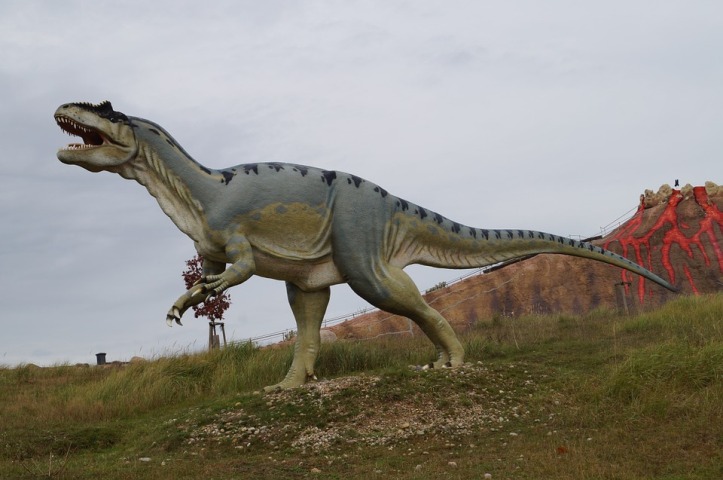Science News Roundup: Scientists propose Tyrannosaurus had three species, not just 'rex'; As climate dangers rise, scientists predict disasters before they happen and more
Tapped for a research project between March and November 2017 - winter in Antarctica - these seals were equipped with the head-mounted conductivity, temperature and depth sensor, which allows scientists to collect observation data, such as water temperatures and salt levels, in areas with extremely harsh environmental conditions. Scientist uses tiny trackers to keep tabs on funnel-web spiders Some Sydney funnel-web spiders are scrambling into the Australian brush carrying special cargo: a telemetry tracker to study how far a mature male can travel at night and whether their movements are affected by the environment and weather.

Following is a summary of current science news briefs.
Scientists propose Tyrannosaurus had three species, not just 'rex'
A group of researchers is proposing that Tyrannosaurus, the most famous of all dinosaurs and the ultimate apex predator, actually includes three species and not just the single T. rex, based on thighbone and tooth variations among dozens of its fossils. T. rex, meaning "tyrant lizard king," has been the sole species of the genus Tyrannosaurus recognized since the dinosaur was first described in 1905. A genus is a broader grouping of related organisms than a species.
As climate dangers rise, scientists predict disasters before they happen
For climate scientists reviewing a Pacific Ocean temperature forecast map in November, a bright red, sideways "V", thousands of kilometres long signalled disaster. Combined with La Nina cooling in the central and eastern Pacific, the V-shaped pattern of warm sea water, stretching from Australia's east coast to the Philippines and back over the ocean north of Hawaii, indicated that halfway around the world in the Horn of Africa the upcoming March-May rainy season would likely fail.
Breakthrough gene-editing technology belongs to Harvard, MIT -U.S. tribunal
A U.S. tribunal overseeing patent disputes ruled on Monday that patents on the breakthrough gene-editing technology known as CRISPR belong to Harvard University and the Massachusetts Institute of Technology. The U.S. Patent and Trademark Office's decision is a defeat for the University of California, Berkeley; the University of Vienna and Nobel Prize-winning researcher Emmanuelle Charpentier.
NOAA's latest weather and fire-tracking satellite launched to orbit
An Atlas V rocket blasted off from Florida on Tuesday carrying to orbit the next big satellite designed by the National Oceanic and Atmospheric Administration (NOAA) to provide round-the-clock tracking of weather, wildfires and climate change over Earth's western hemisphere. The GOES-T spacecraft is the third in the latest series of advanced geostationary satellites, credited with revolutionizing real-time weather forecasting, environmental monitoring and hazard detections from space.
Stellar 'vampire' finds love at first bite with companion star
Astronomers have gotten a good look at what happens when a "vampire" star sucks the outer layers of material from a companion star, stripping this "bitten" victim down to a mere stellar core. Researchers said on Wednesday data obtained using Chile-based European Southern Observatory (ESO) telescopes clarified the nature of a star system called HR 6819, showing that its two companion stars were not accompanied by a black hole as was previously proposed.
Seals help Japanese researchers collect data under Antarctic ice
A seal wearing a helmet with an antenna might look unusual, but eight Weddell seals, each with a 580g monitoring device on their heads, have been helping Japanese researchers survey the waters under the thick ice sheet in Antarctica. Tapped for a research project between March and November 2017 - winter in Antarctica - these seals were equipped with the head-mounted conductivity, temperature and depth sensor, which allows scientists to collect observation data, such as water temperatures and salt levels, in areas with extremely harsh environmental conditions.
Scientist uses tiny trackers to keep tabs on funnel-web spiders
Some Sydney funnel-web spiders are scrambling into the Australian brush carrying special cargo: a telemetry tracker to study how far a mature male can travel at night and whether their movements are affected by the environment and weather. Caitlin Creak, a PhD candidate at the School of Biological, Earth and Environmental Sciences of the University of New South Wales, has been tracking the male Sydney funnel-web, one of the world's deadliest spiders, for two summers. The nocturnal arachnid lives within around 100km (62 miles) of Australia's largest city, and is mostly active between November and April.
Ukraine gets Starlink internet terminals - and friendly warning about safety
Ukraine on Monday said it had received donated Starlink satellite internet terminals from SpaceX, but an internet security researcher warned these could become Russian targets. "Starlink — here. Thanks, @elonmusk," Ukraine's vice prime minister, Mykhailo Fedorov, tweeted, days after asking SpaceX's billionaire chief executive officer Elon Musk for help. Fedorov's tweet included a picture of the back of a military-looking truck, loaded with terminals.
(With inputs from agencies.)
ALSO READ
Trump Administration Scrutinizes Harvard's Federal Funds Amid Antisemitism Concerns
Harvard Faces Federal Review Over Anti-Semitism Allegations
Trump Administration's $9 Billion Scrutiny: Harvard Under the Microscope
Federal Scrutiny on Harvard: Trump Administration's Antisemitism Crackdown
Trump Administration Probes Harvard's Federal Contracts Over Antisemitism Allegations










